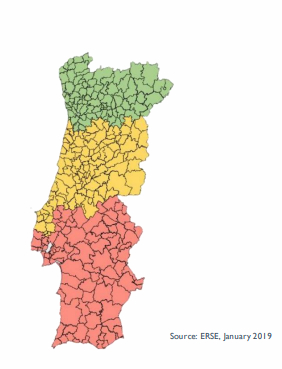- within Corporate/Commercial Law topic(s)
BACKGROUND
The Portuguese low-voltage grid ("LV Grid") is operated by private entities awarded with a concession provided by the municipalities (up to the maximum length of 20 years). It can also be operated directly by each municipality , but none of them is currently doing so.
E-Redes - Distribuição de Eletricidade, S.A. ("E-Redes") is the predominant force in the management of the LV Grid, supplying 99 ,5% of the Portuguese electricity consumers. There are other 10 small operators, small local communities organized as cooperatives operating exclusively within individual municipalities or autonomous regions (Azores and Madeira).
Most of the existing concession contracts were to expire between 2021 and 2022 . The new tenders for awarding LV Grid concessions were initially planned for 2019 but only in the end of 2023 , the former Portuguese Government finally published the tender documents. And shortly before leaving office it announced the timetable for the launching of the LV Grid concession tenders.
One of the reason for this delay can be found in the Portuguese Energy Supervision Authority ("ERSE") and the National Association of Municipalities ("ANM") different views regarding the number of tenders to be launched, a key element in assessing the competitiveness of the procedures.
In case the new Government confirms this timetable, the map of the tenders will be decided until October 31 st , 2024 . The municipalities must decide by then whether to join or not in intermunicipal concessions tenders. If they do, they will have until March 31 st , 2025 , to make all resolutions needed to launch the public tenders and, finally, their representative has until June 30 th , 2025 , to launch the public tender procedure.
Unfortunately, some of the concession award criteria, such as the years of required experience, may compromise the small grid operators' ability to participate in the tender and may force them to participate in jointventures.
This paper provides an overview of the regulations and of program for the LV Grid tenders and other information that we trust may be relevant for market players interested in participating .
HOW MANY CONCESSIONS?
According to Law 31 /2017 of May 31 st (the "CIM Law"), the basis of the of the concession of energy distribution networks should be the intermunicipal communities (comunidades intermunicipais) known as "CIM" . However, ERSE considered that the 23 CIM in mainland Portugal cannot provide the similarity of the referred criteria, due to the significant differences within each of them.
After a public consultation, ERSE suggested in January 2019 the division of the Portuguese mainland into three different territories by grouping CIMs in three areas: north, center, and south . This territorial division determines the number of tenders which, according to ERSE's proposal, would be three.
ANM suggested a single concession for the Portuguese mainland as it is the option that best guarantees territorial cohesion and the uniformity of prices. The municipalities can either: (i) confirm ERSE's solution by launching the three tenders or (ii) create a new division supported on technical studies that confirm the viability of their solution.
The municipalities have until 31 st October 2024 to agree on the creation of intermunicipal concessions and, in that case, publish the technical studies on which this decision was based. Only at that point will we know the number of concessions that will be tendered.


THE TENDER SCOPE
The tenders will end with the execution of a services agreement between the awarding entities and the concessionaries. The main purpose of such agreement is the rendering of the grid distribution services by the concessionaires.
The grid distribution services refers to the operation of the following assets:
- LV lines, cables and connection grids included in the public grid;
- Transformers and ancillary facilities; and
- Metering and measuring equipment;
- Real estate belonging to the Concessionaire on which the assets referred to above are installed, as well as any easements created;
- Other movable or immovable assets necessary for the performance of the activities covered by the concession;
- The Concessionaire's technical and human resources, including electronic platforms, allocated to carrying out the functions of operator of the LV electricity distribution network included in the concession.
The awarding entities may exclude the public lighting ("PL") grid in the scope of the tenders.
This provides, for the first time in Portugal, the opportunity to split the LV Grid operation of the PL grid operation (which is more common in other countries, such as Germany or Spain).
If the PL services are included in the scope of the tenders, the PL installations, luminaires, their supports, columns and any the measure and control systems will also be included in the concession.
The consideration for the operation of the PL grid will be a fee calculated based on the costs borne by operators, as set by ERSE.
The decision of the awarding entities to include or not the PL grid in the tenders' scope will be known until the date of the tenders launch : October 31 st , 2024 for individual municipalities' concessions and June 30 th , 2025 for intermunicipal concessions.
THE LV GRID OPERATOR PROFILE
The LV Grid operation activity must be carried out in exclusivity . The LV Grid operators are not allowed to:
- Purchase electricity for supplying;
- Own, develop, manage or operate storage facilities, except when such facilities are integrated on the public grid and subject to a favourable opinion from ERSE; and
- Own, develop, manage or operate recharging point, except if for their own use or if an authorization is issued by ERSE.
In addition, the encumbering or the transfer of shares representing the awarded applicant require the grantor of the concession prior consent.
Other LV Grid operators' obligations include:
- The design and preparation of the plans for the remodelling and expansion of the LV Grid;
- Grant to the municipalities all the information related to the concession;
- Subscribe a civil liability insurance covering the damages caused to third parties; and
- Manage the public illumination (if applicable, see previous section).
After the approval of the projects related to the expansion of the LV Grid, the LV Grid operators are entitled to expropriate or create administrative easements. However, the LV Grid operators are responsible for the compensations to be paid to the expropriated owners.
The municipalities may take over the LV Grid if there are there are serious deficiencies in its organization and operation or if the facilities and equipment are likely to compromise the regularity or quality of the service.
The LV Grid operators shall bear the costs resulting for the municipalities of the exercise of LV Grid operators' obligations and other costs incurred to restore the normality.
The remuneration of the LV Grid operators is set yearly by ERSE, considering the costs involved with the management of the LV Grid.
To view the full article click here
The content of this article is intended to provide a general guide to the subject matter. Specialist advice should be sought about your specific circumstances.


